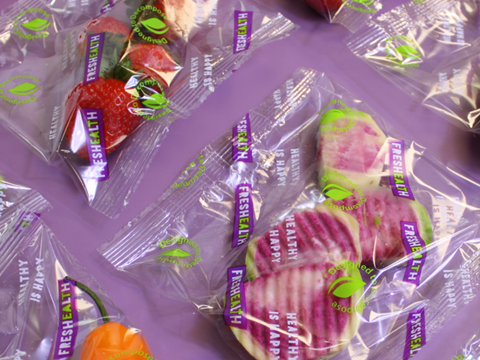
By sending fresh produce to schools in ‘biodegradable’ plastic films and ‘certified compostable’ cups, DNO Produce and Eco-Products expect to keep 945,000 pounds of fossil-based plastic out of landfills every year.
Instead of conventional plastic baggies, DNO will distribute 94.3% of its single-serve produce offerings in new film packaging designed for ‘enhanced’ degradation. Apparently, it has been tested in line with the ASTM D5511 standard and was found to achieve approximately 100% degradation in 3,684 days, or ten years.
Biodegradation is said to work best in microbial diverse disposal environments, but DNO suggests that timelines could vary based on environmental factors.
The company views this as a significant improvement compared to the hundreds of years it takes traditional, fossil-based plastics to break down – and it instructs consumers to dispose of the packaging in the general waste stream.
Additionally, its single-serve plastic cups (believed to constitute 5.7% of DNO’s produce offerings for schools) will be replaced with ‘fully compostable’ alternatives developed alongside Eco-Products.
Described as a ‘first-to-market’ solution, the cups are recommended for disposal in compost waste streams, but are not prohibited from general waste bins if composting is unavailable. They are believed to biodegrade into nutrient-rich compost and contribute to soil health as they break down.
DNO says its new packaging complies with food safety standards set by the US Food and Drug Administration (FDA) and has been verified by third-party laboratories. It is designed to avoid leaching chemicals or substances into the packaged materials, while also claiming to uphold shelf life, durability, and affordable product prices.
In its FAQs, the company explains its reasons for choosing compostable packaging over recyclable alternatives: “Recycling food contact plastic film is not currently an option, as there are many challenges with recyclable films matching packaging performance, the ability for schools and municipalities to collect the films—particularly because there is moisture and food residue—and there are very few markets for the used film across the U.S.”
It believes that its new films will keep over 500,000 pounds of fossil-based plastics out of landfills across the USA, with the compostable cups set to avoid over 400,000 pounds. Citing the figure that the average consumer uses around 220 pounds of fossil-based plastic annually, DNO argues that its redesigns will save the same amount of plastic as approximately 4,296 people use in a year.
Earlier this year, DS Smith and Priméale joined forces to package the Vegetable Kit product range in a fully recyclable, fibre-based punnet with a cellulose hydrate lid – a solution expected to keep products fresh in transit and on the shelf while avoiding plastic packaging.
Since then, food and drink wholesaler Booker has implemented compostable options into its own-label packaging range for event caterers, food trucks and takeaways, including hinged lid burger boxes, chips and churros trays made from bagasse.
Makro and VML have also developed stickers to help consumers gauge the ripeness of fresh produce and offer serving suggestions for each stage of ripeness. This is anticipated to cut down on unnecessary food waste.
If you liked this story, you might also enjoy:
The ultimate guide to the Packaging and Packaging Waste Regulation in 2025
How are the top brands progressing on packaging sustainability?
Everything you need to know about global packaging sustainability regulation in 2025
The key to increasing the use of reusable packaging in supermarkets


















No comments yet